The Arabian Prophet his message and Achievements By Dr Ata Mohy-ud-din
The Arabian Prophet his message and Achievements By Dr Ata Mohy-ud-din
The Arabian Prophet his message and Achievements By Dr Ata Mohy-ud-din
| BOOK AUTHOR | |
|---|---|
| LANGUAGE | English |
| LIBRARY |
Related products
-
Zaad al-Ma’ad Seerat Khair ul-Ibad S.A.W Part four
زادالمعاد
سیرت خیر العباد ﷺ
از: علامہ ابن قیم الجوزی
مترجم حاشیہ نگار : مفتی محمد عزیز الرحمن بجنوری
حصہ چہارم
٭علامہ ابن قیم کی کتاب زاد المعاد ، تعار ف ،منہج و اسلوب اور امتیازی خصوصیات٭
Zaad al-Ma’ad
Seerat Khair ul-Ibad S.A.W
By: Allama Ibn Qayyim al-Jawziyya
Mutarjam Hashiya Nigar: Mufti Muhammad Aziz ur-Rahman Bijnori
Part four
کتب سیرت میں زاد المعاد کی منفرد خصوصیت یہ ہے کہ اس میں صرف حالات اور واقعات کے بیان پر اکتفاء نہیں کیا گیا بلکہ ہر موقع پر یہ بات واضح کرنے کی کوشش کی گئی ہے کہ آنحضرت کے فلاں قول اور فلاں عمل سے کیا حکم مستنبط ہو سکتا ہے اور آنحضرت کے حالات اور معمولات زندگی میں ہمارے لیے کیا کچھ سامانِ موعظت موجود ہے گویا اس کتاب میں امت کے سامنے رسول کریم کا اسوہ حسنہ اس طرح کھول کر رکھ دیا گیا ہے کہ وہ زندگی کے ہر شعبے میں اس سے ہدایت حاصل کر سکے۔
-
Aalmi Manshoor 1948 Main Insani Haqooq Kay Tasawar Aur Samaji Asraat Ka Seerat e Nabviya(S.A.W) Ki Roshni Main Aik Taqabli Jaiza
عالمی منشور 1948 ء میں انسانی حقوق کے تصور اور
سماجی اثرات کا سیرت نبوی علی صاحبہا الصلاة والسلام
کی روشنی میں ایک تقابلی جائزہ
)تحقیقی مقالہ برائے پی ایچ ڈی اسلامک سٹڈیز(
مقالہ نگار: بُرہان الدین
نگران مقالہ:ڈاکٹر محمد طاہر
ڈیپارٹمنٹ آف اسلامک سٹڈیز،عبدالولی خان یونیورسٹی مردان،خیبرپختونخوا
اکیڈیمک سیشن: 2015ء – 2018ء
Aalmi Manshoor 1948 Main Insani Haqooq Kay Tasawar Aur Samaji Asraat Ka Seerat e Nabviya(S.A.W) Ki Roshni Main Aik Taqabli Jaiza
(PhD Thesis)
Research by : burhan u Din
-
Zaad al-Ma’ad Seerat Khair ul-Ibad S.A.W Part two
زادالمعاد
سیرت خیر العباد ﷺ
از: علامہ ابن قیم الجوزی
مترجم حاشیہ نگار : مفتی محمد عزیز الرحمن بجنوری
حصہ دوم
٭علامہ ابن قیم کی کتاب زاد المعاد ، تعار ف ،منہج و اسلوب اور امتیازی خصوسیات٭
Zaad al-Ma’ad
Seerat Khair ul-Ibad S.A.W
By: Allama Ibn Qayyim al-Jawziyya
Mutarjam Hashiya Nigar: Mufti Muhammad Aziz ur-Rahman Bijnori
Part two
-
International Seminar the pace of waqf in islam
International Seminar the pace of waqf in islam
-
Rasool-e-Akram (S.A.W) ki askari aur siyasi zindagi mein Sulh Hudaybiyah ka kirdar, aur aaj ke dor mein iski zaroorat aur ahmiyat
رسول اکرم ﷺ کی عسکری اور سیاسی زندگی میں صلح حدیبیہ کا کردار
اور عصر حاضر میں اس کی ضرورت واہمیت, علمی تحقیقی جائزہ
تحقیقی مقالہ برائے پی ایچ ڈی (Ph.D)
ریسرچ اسکالر: محمد طیب خان
زیر نگرانی:ڈاکٹر حافظ محمد ثانی
شعبہ اسلامیات
وفاقی اردو یو نیورسٹی، اسسٹنٹ پروفیسر
شعبہ اسلامیات,عبدالحق کیمپس کراچی وفاقی اردو یونیورسٹی ، عبدالحق کیمپس کراچی
Rasool-e-Akram (S.A.W) ki askari aur siyasi zindagi mein Sulh Hudaybiyah ka kirdar, aur aaj ke dor mein iski zaroorat aur ahmiyat
(Phd. Thesis)
BY: MUHAMMAD TAYYAB KHAN
-
SEERAT AL-NABI S.A.W
SEERAT AL-NABI
The Life and Times of the Great Prophet of Islam
Hadrat Muhammad Rasool-Allah (may peace be on him)
and
His Chief Companions
By: Professor Dr. Mahmud Brelvi
With a Foreword by
Mr. A. K. Brohi
Chairman, National Hijra Committee
INSTITUTE OF SINDHOLOGY
University of Sind
Jamshoro, Sind, Pakistan.
1982/Rabi’-ul-Awwal, 1403 A.H.
-
Dur e Jadeed K Mushtarqeen Aur Un Ka Andaaz Seerat Nigari (Constantin Virgil Gheorghiu , Michael Cook aur Karen Armstrong ) Aik Tehqeeqi o Tanqeedi Jaiza
دورِ جدید کے مستشرقین اور ان کا اندازِ سیرت نگاری (کانسٹن ور جل جورجیو،
مائیکل کک اور کیرن آرم سٹرانگ ) ایک تحقیقی و تنقیدی جائزہ
تحقیقی مقالہ برائے پی ایچ ڈی علوم اسلامیہ
مقالہ نگار : فوزیہ فیاض
نگران مقالہ:پروفیسر ڈاکٹر محسنہ منیر
شعبہ علوم اسلامیہ،اسلامیہ لاہور کالج برائے خواتین یونی ورسٹی لاہور،پاکستان
Dur e Jadeed K Mushtarqeen Aur Un Ka Andaaz Seerat Nigari (Constantin Virgil Gheorghiu , Michael Cook aur Karen Armstrong ) Aik Tehqeeqi o Tanqeedi Jaiza
(PhD Thesis)
Research by : Fozia Fayyaz
-
MUHAMMAD (S.A.W) THE EDUCATOR OF MANKIND
MUHAMMAD (S.A.W) THE EDUCATOR OF MANKIND
BY: AFZALUR RAHMAN
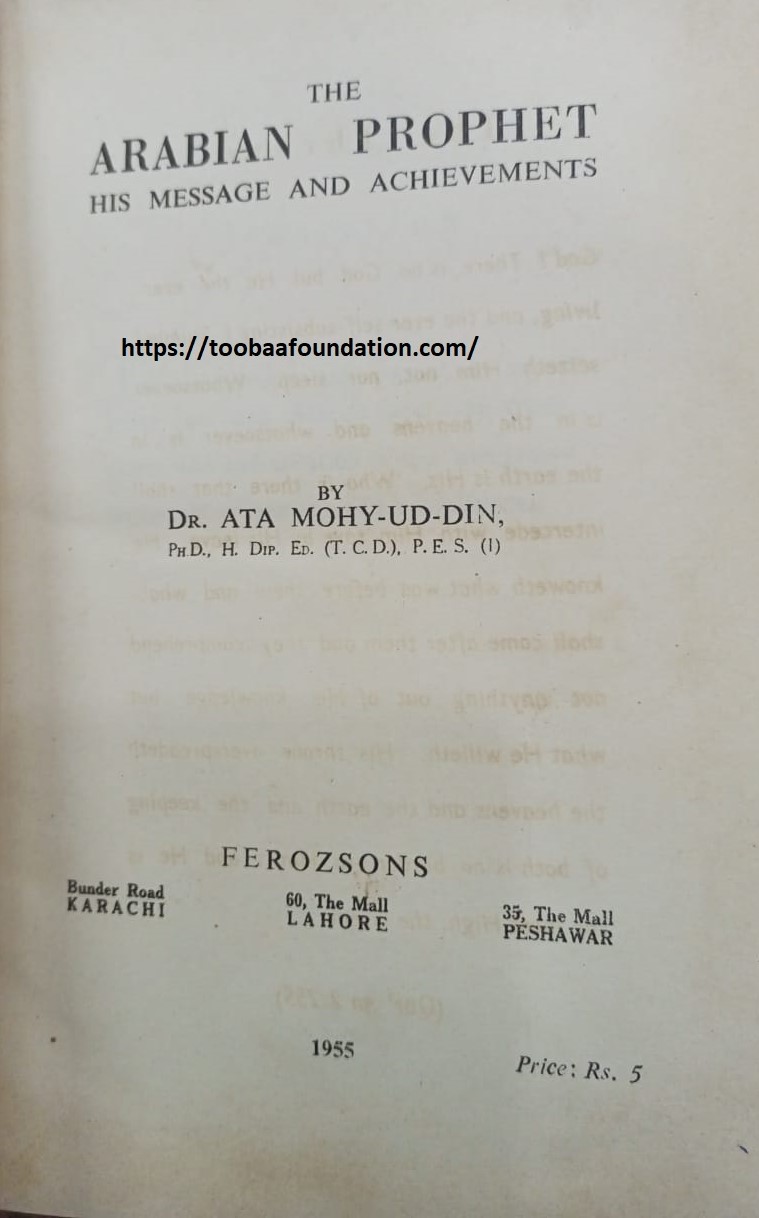
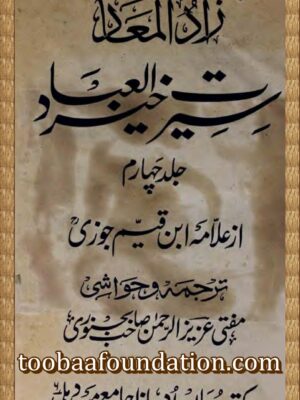
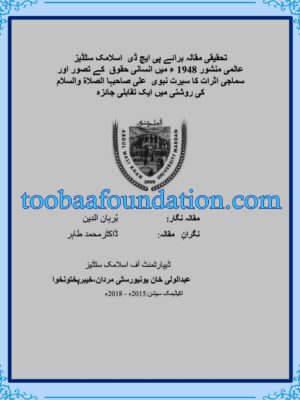
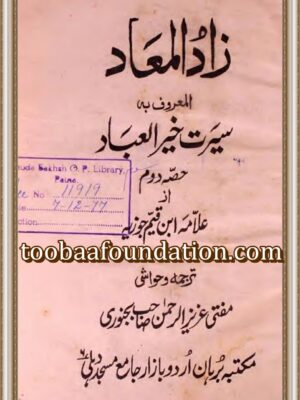
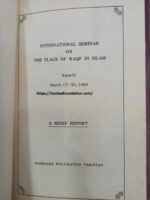
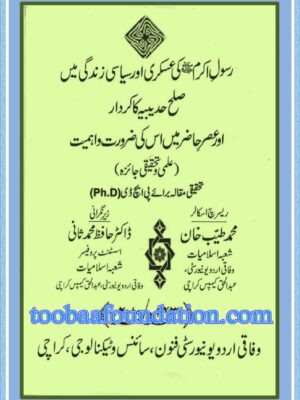

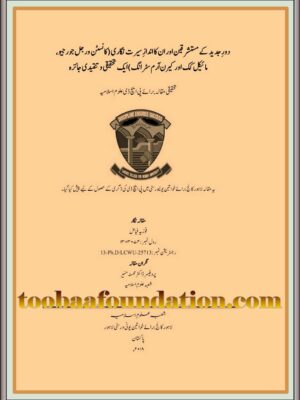

Be the first to review “The Arabian Prophet his message and Achievements By Dr Ata Mohy-ud-din”